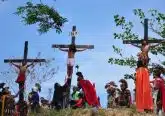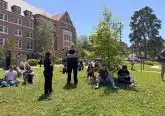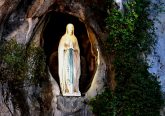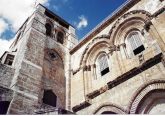Baltimore religious leaders seek unity in wake of violence, tension
By Cindy Wooden
VATICAN CITY (CNS) — Leaders of faith communities in Baltimore, seeking healing and unity a year after the death of Freddie Gray, carried the pain and the hopes of their faithful to the Vatican, asking Pope Francis to bless their work.
When Archbishop William E. Lori of Baltimore introduced the leaders to the pope March 2 at the end of his weekly general audience, he not only offered his support, but he also asked for their prayers.
“We’re here to help reconcile a badly fragmented community,” Archbishop Lori told Catholic News Service after the meeting.
Being in Rome together March 1, he said, it was not possible to ignore the “Super Tuesday” political primaries going on at home.
“One of the themes that kept coming up in our conversation is how divided our political discourse has become, how uncivil it has become, how pronounced the tendencies are to erect barriers” while people of faith are called to build bridges, the archbishop said.
The Rev. Frank Reid III, senior pastor of Bethel African Methodist Episcopal Church, said the trip to Rome was important because “this pope is the pope of hope, the pope of mercy and a pope who is grabbing the attention of the millennials,” the young adults who in particular are looking for signs of hope after the tension and violence in Baltimore that followed the death of Gray, 25, in police custody last April.
With a variety of Christian leaders, an imam and a rabbi traveling together, praying alongside one another and meeting the pope, Rev. Reid said, the trip is a way “to continue the healing process.”
With the U.S. presidential primaries underway, the A.M.E. pastor said the tone of the political campaign is “a wake-up call for the greater work that our communities, our faith communities, have to do.” The campaign rhetoric shows that “not only are our poor, underserved African-Americans and Latinos having challenges, but the culture of anger and fear also exists among middle-class white Americans — baby boomers — who are worried about their future.”
Father Donald Sterling, pastor of New All Saints Catholic Church, said it was important to travel to Rome with a group of his peers, a group that shares “the same heartbeat for life and for love of God and neighbor” and one that recognizes “there is power in prayer.”
Rabbi Steven Fink, the senior rabbi at Temple Oheb Shalom, gave Pope Francis a bag filled with local Baltimore snacks and baked goods.
“He said, ‘Please pray for me,’ which was a rather incredible statement coming from one of the most powerful men on earth,” the rabbi said. “It shows how humble and modest he is.”
Rabbi Fink said Pope Francis’ audience talk, reflecting on a passage from the Prophet Isaiah, spoke of God’s love for all people. “It’s a message of acceptance and mercy.”
After working together in Baltimore to promote healing and unity, the rabbi said he made the pilgrimage because the leaders have become his friends and not just colleagues. “We have common values and a similar background and common respect for each other, for faith and for God.”
The mood in Baltimore a year after Gray’s death “is still very unsettled,” Rabbi Fink said, but city officials, religious and community leaders realize they have “to work together to make it a healthier, safer and more prosperous city.”
Imam Earl El-Amin, the resident imam at the Muslim Community Cultural Center of Baltimore, said the pilgrimage for him was a time of special “supplication,” of calling upon God’s mercy — which Muslims do every time they invoke God’s name — and pleading for God’s help in recognizing that whatever ethnic group or religion one belongs to, all people are members of the human family first.
The Rev. Alvin C. Hathaway Sr., senior pastor at Union Baptist Church, said in Baltimore that one still feels “a sense of desperation, there’s a sense of disillusionment and there’s a sense of fear,” which faith leaders are called to help address.
Lutheran Bishop Wolfgang D. Herz-Lane of Delaware-Maryland said the pilgrimage was a reminder that many of the concerns of faith communities in Baltimore are actually universal concerns. “People being divided, systemic racism, people not respecting one another, violence, a breakdown of community and family — those are not things that are particular to Baltimore” and Pope Francis “has spoken very powerfully to these very same issues.”
– – –
Follow Wooden on Twitter: @Cindy_Wooden.
– – –
Copyright © 2016 Catholic News Service/U.S. Conference of Catholic Bishops. www.catholicnews.com. All rights reserved. Republishing or redistributing of CNS content, including by framing or similar means without prior permission, is prohibited. You may link to stories on our public site. This copy is for your personal, non-commercial use only. To request permission for republishing or redistributing of CNS content, please contact permissions at [email protected].













